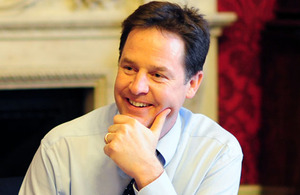First ever NHS waiting time standards for mental health announced
Nick Clegg has announced new waiting time standards, bringing treatment for mental health problems in line with physical health.

The Deputy Prime Minister, Nick Clegg, has today announced that treatment for mental health conditions will be brought into line with other NHS services with the introduction of the first ever waiting time standards. Bringing treatment for mental health problems on a par with physical health will end years of discrimination. There will also be £120 million to improve mental health services.
For the first time, from April 2015, most patients needing talking therapies – for conditions like depression – will be guaranteed the treatment they need in as little as 6 weeks, with a maximum wait of 18 weeks.
For many patients experiencing their first episode of psychosis, the NHS will start to provide treatment within 2 weeks of referral – bringing it into line with consultations for cancer. Evidence shows that treating psychosis rapidly can dramatically improve patients’ chances of recovery and potentially save £44 million each year in hospital admissions.
The Deputy Prime Minister said:
At least 1 in 4 of us will experience a mental health problem in our lives. Whilst I have nothing but praise for the tremendous work of NHS staff, the system is still letting patients down.
It’s wrong that relatives and friends needing a hip operation can expect treatment within a clear time frame but someone with a debilitating mental health condition has no clarity about when they will get help.
For years, NHS waiting standards have existed for patients with physical ailments and they have drastically cut long waits. Now we are finally ending the injustice of people with mental health conditions waiting far too long for treatment with the first ever waiting time standards for NHS mental health services.
The Deputy Prime Minister held a reception to mark World Mental Health Day on 10 October 2014. View photos from the event.
The announcement is part of a radical 5-year plan to end years of imbalance between mental and physical healthcare services, backed by £40 million this year and £80 million freed up next year.
Care and Support Minister, Norman Lamb, said:
I want to build a fairer society and that means mental health has got to be a priority for everyone. As well as being potentially devastating for people affected, mental illness has an enormous impact on our economy. That’s why, through these plans, I am absolutely determined to make sure anyone with a mental health condition can expect the same standards of care as they would for a physical health problem.
I urge the whole health and care system to engage with these ambitious plans to drive up standards so that, by 2020, mental and physical health services will be given equal priority in all parts of the country.
Simon Stevens, NHS England’s Chief Executive, said:
This is an important moment when we will bring parity of esteem for mental health services a step closer. Putting access and waiting standards in place across all mental health services, and delivering better integration of physical and mental health care by 2020, will bring us much closer towards that aim.
Currently, most people who are referred for treatment for a physical health problem can expect to start their care within 6 weeks, with an absolute maximum of 18 weeks. The plans announced today will mean that people referred for talking therapies will benefit from the same standards.
Similarly, people referred for an urgent cancer consultation can expect to be seen within 2 weeks. Today’s announcement will ensure that many people needing urgent care for psychosis will start to be treated with the same urgency.
The national waiting time standards will tackle the regional variations where some people have very long waiting times for talking therapies as well as making sure that there is proper investment in making these services available within an acceptable time.
Other measures include:
- investment in psychiatry services in acute hospitals, so that more people than ever before who go to accident and emergency (A&E) departments in a mental health crisis, for example if they have self-harmed, will get the right help at the right time
- a £7 million investment by NHS England to create 50 new in-patient beds for children and young people and better case management so that children with specialist needs get the right care in the right place, as close as possible to their homes and families
Background
The Deputy Prime Minister first signalled his ambition for maximum waiting times for some mental health services when he convened a national conference for mental health practitioners and charities on 20 January 2014.
From 1 April 2015 (to be fully implemented by April 2016), the new waiting time standards will be as follows:
- 75% of people referred for talking therapies for treatment of common mental health problems like depression and anxiety will start their treatment within 6 weeks and 95% will start within 18 weeks
- at least 50% of people going through their first episode of psychosis will get help within 2 weeks of being referred: the aim is to increase this percentage in future years
Mental illness costs the country as much as £100 billion each year through lost working days, benefits and treating preventable illness, but these plans are expected to make huge savings:
- improved access to talking therapies will help tackle the 70 million working days lost annually due to mental health problems
- early treatment for people with psychosis could save the NHS £44 million a year in reduced hospital admissions through people reaching crisis point
- improved psychiatric liaison services in acute hospitals could save each hospital an average of £5 million a year by cutting down on admissions and length of stay
Updates to this page
-
Link added to photos from Deputy Prime Minister's reception to mark World Mental Health Day.
-
First published.